Introduction
Protein shakes are a popular supplement among athletes and fitness enthusiasts who want to increase their daily protein intake. They come in powder form and can be mixed with liquids like milk or water, and often contain added ingredients like vitamins and minerals. But are protein shakes healthy? In this article, we’ll explore the pros and cons of consuming protein shakes and help you determine if they’re right for you.
Examining the Pros and Cons of Protein Shakes
Protein shakes offer a variety of potential health benefits and drawbacks. Let’s take a closer look.
Benefits of Protein Shakes
Protein shakes can provide adequate nutrition for those who don’t have time for regular meals. They also offer a low calorie option for those trying to lose weight. Here are some of the potential benefits of drinking protein shakes:
- Adequate Nutrition: Protein shakes can provide your body with the essential nutrients it needs. They typically contain all nine essential amino acids, as well as other vitamins and minerals.
- Convenience: Protein shakes are easy to make and can be taken with you on the go. This makes them ideal for busy lifestyles.
- Low Calorie Option: Many protein shakes are low in calories, making them a great choice for those trying to lose weight.
Drawbacks of Protein Shakes
While protein shakes can offer many benefits, there are also some potential drawbacks. Here are some of the potential drawbacks of consuming protein shakes:
- Potential Contamination: Protein shakes may be contaminated with bacteria or other contaminants that can cause food poisoning or other illnesses.
- High Sugar Content: Some protein shakes may contain high levels of added sugar, which can contribute to weight gain and other health issues.
- Potential Allergens: Protein shakes may contain allergens such as dairy, nuts, or soy, which can cause allergic reactions in some people.

Exploring the Nutrients in Protein Shakes
Protein shakes typically contain a variety of different nutrients, including proteins, carbohydrates, fats, vitamins, and minerals. Let’s take a closer look at each of these.
Protein Types
Protein shakes typically contain one or more types of protein. The most common types of protein found in protein shakes are whey and casein, both of which are derived from milk. Other types of protein, such as plant-based proteins, are also available.
Carbohydrates
Protein shakes may also contain carbohydrates, which provide energy and help regulate blood sugar levels. The type and amount of carbohydrates in a protein shake will vary depending on the product.
Fats
Protein shakes may also contain fats, which can help keep you feeling full and provide essential fatty acids. The type and amount of fat in a protein shake will vary depending on the product.
Vitamins and Minerals
Protein shakes may also contain vitamins and minerals, which are essential for proper bodily function. The type and amount of vitamins and minerals in a protein shake will vary depending on the product.
The Benefits and Drawbacks of Protein Shake Consumption
Protein shakes can offer a variety of potential benefits, including weight loss, muscle building, and improved blood sugar regulation. However, there are also some possible side effects, such as digestive issues and kidney damage. Let’s take a closer look.
Weight Loss
Drinking protein shakes may help you lose weight, as they are typically low in calories and can help keep you feeling full. According to a study published in the British Journal of Nutrition, replacing one meal per day with a meal replacement shake was found to result in significant weight loss after 12 weeks.
Muscle Building
Protein shakes can also help build muscle, as they are typically high in protein. A study published in the American Journal of Clinical Nutrition found that consuming a protein shake after exercise resulted in increased muscle synthesis.
Improved Blood Sugar Regulation
Protein shakes may also help regulate blood sugar levels, as they can help slow down digestion and prevent spikes in blood sugar. A study published in the journal Nutrition & Metabolism found that consuming a protein shake prior to meals resulted in improved glucose metabolism.
Potential Side Effects
Although protein shakes can offer many potential benefits, there are also some possible side effects. Drinking too much protein can lead to digestive issues such as bloating and constipation, and consuming large amounts of protein over a long period of time can lead to kidney damage. It’s important to speak to your doctor before beginning any new supplement regimen.
Is a Protein Shake Right for You?
Before deciding whether or not to incorporate protein shakes into your diet, it’s important to evaluate your individual needs. Consider your lifestyle, goals, and health history to determine if a protein shake is right for you.
Evaluating Your Needs
Consider your current diet and lifestyle and decide if adding a protein shake could benefit you. If you often skip meals or struggle to get enough protein in your diet, a protein shake may be a good option. On the other hand, if you already eat a balanced diet, a protein shake may not be necessary.
Consulting a Medical Professional
It’s always a good idea to speak to your doctor before beginning any new supplement regimen. Your doctor can help you determine if a protein shake is right for you and can provide advice on how to safely incorporate protein shakes into your diet.

Uncovering the Truth Behind Protein Shake Health Claims
Before purchasing a protein shake, it’s important to read the label carefully. Many protein shakes make claims about health benefits that may not be true. Here are some things to look out for.
False Advertising
Be wary of protein shakes that make exaggerated health claims or promise quick results. Many protein shakes are marketed as “miracle” products or “weight loss wonders,” but these claims are often false. Be sure to read the ingredients list carefully and look for scientific evidence to back up any claims made.
Misleading Labels
Some protein shakes may contain hidden ingredients or added sugars that aren’t listed on the label. Be sure to check the ingredient list and nutrition facts panel to ensure that the product is free of any unwanted additives.

Investigating the Different Types of Protein Shakes Available
There are several different types of protein shakes available, each with their own unique benefits and drawbacks. Here are some of the most popular types of protein shakes.
Whey Protein
Whey protein is the most common type of protein found in protein shakes. It’s derived from cow’s milk and is a complete source of protein, meaning it contains all nine essential amino acids. It’s also quickly absorbed by the body, making it ideal for post-workout recovery.
Plant Protein
Plant-based protein shakes are made from a variety of plant sources, such as peas, hemp, and brown rice. They are typically lower in calories and fat than whey protein, but they may not provide as much protein per serving. Plant-based protein shakes are a good choice for those following a vegan or vegetarian diet.
Meal Replacement Shakes
Meal replacement shakes are designed to replace an entire meal. They typically contain a higher amount of calories and nutrients than traditional protein shakes. Meal replacement shakes can be a convenient way to get all of your essential nutrients in one meal.
Analyzing the Impact of Protein Shake Consumption on Overall Health
Protein shakes can offer a variety of potential benefits, including weight loss, muscle building, and improved blood sugar regulation. However, there are also some possible risks, such as digestive issues and kidney damage. It’s important to speak to your doctor before beginning any new supplement regimen.
Potential Benefits
Protein shakes can provide your body with the essential nutrients it needs, and they can be a convenient and low calorie option for those trying to lose weight. They may also offer other benefits, such as improved blood sugar regulation and muscle building.
Possible Risks
It’s important to remember that protein shakes can also have some negative side effects, such as digestive issues and kidney damage. It’s important to speak to your doctor before beginning any new supplement regimen.
Conclusion
Protein shakes can offer a variety of potential benefits, including weight loss, muscle building, and improved blood sugar regulation. However, there are also some possible risks, such as digestive issues and kidney damage. Before deciding whether or not to incorporate protein shakes into your diet, it’s important to evaluate your individual needs and consult a medical professional.
In conclusion, protein shakes can be a convenient and nutritious way to meet your daily protein needs. However, it’s important to be aware of the potential risks and speak to your doctor before beginning any new supplement regimen.
(Note: Is this article not meeting your expectations? Do you have knowledge or insights to share? Unlock new opportunities and expand your reach by joining our authors team. Click Registration to join us and share your expertise with our readers.)
